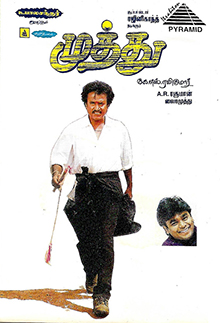Development
Ravikumar considered "Thillana Thillana" the song "most difficult to crack". It initially had the lyrics, "Tamizh naatu makkal kootam unnodu dhaane, naan mattum thalli nippena" (transl. All of Tamil Nadu is with you, would I stand far away?) which Ravikumar disliked. Vairamuthu eventually became irritated and said, "Ennanga neen[g]a, thanana thanana thillana thillana-nu" (transl. What man, you are like thanana thanana thillana thillana) catching Ravikumar's attention. He realised it was the hook the song needed, so Vairamuthu wrote "Thillana thillana, nee thithikindra meena". The word "meena" was replaced with "thena" at Ravikumar's suggestion since he had previously written "Meena Ponnu" for Nattamai (1994). [1] The song sampled African humming which had been previously sampled by French group Deep Forest in "Night Bird". [6]
Rahman composed a tune beginning with the gibberish word "kuluvalilae". When it came to writing lyrics, Vairamuthu could not find a substitute word for kuluvalilae that was equally long but made sense. He and Ravikumar wanted Rahman to change the tune slightly to accommodate a better word but realised it was not possible without disturbing the song. As a result, kuluvalilae was kept. Ravikumar recalled, "I just made it seem as though the song was set in this village called Kuluvaele[ sic ] and put up a road sign indicating that it was the name of the village and then had the song start with the word". [7] The background rhythm and beats of "Kuluvalilae" were borrowed from "Rescue Me" by Fontella Bass. [8] The song includes "Omanathinkal Kidavo", a lullaby composed by Irayimman Thampi. [9] [10]
The concept of "Oruvan Oruvan", a song reflecting philosophies relevant to society through its lyrics, [11] was inspired by "Aandavan Ulagathin Muthalali" from Thozhilali (1964). Ravikumar told Vairamuthu what he wanted the lyrics to portray. [1] The song stresses that "God is above all and that greed will be the end of life". [12] Paravai Muniyamma was originally asked to sing "Kokku Saiva Kokku", but declined, [13] and the song was instead sung by Theni Kunjarammal. [3] It is set in the Carnatic raga known as Kalyani while "Vidukathaiya" is set in Chakravakam. [15] Recording of the songs took place at the composer's Panchathan Record Inn studio in Chennai. [3]
This page is based on this
Wikipedia article Text is available under the
CC BY-SA 4.0 license; additional terms may apply.
Images, videos and audio are available under their respective licenses.
